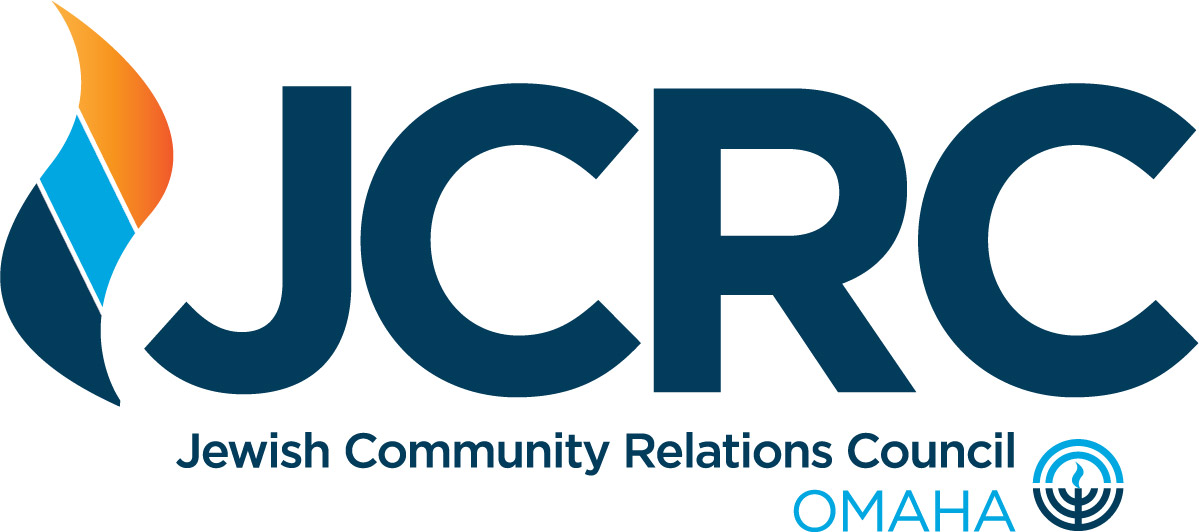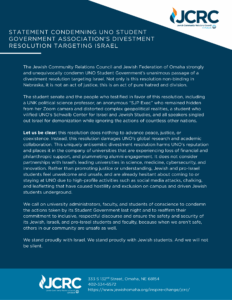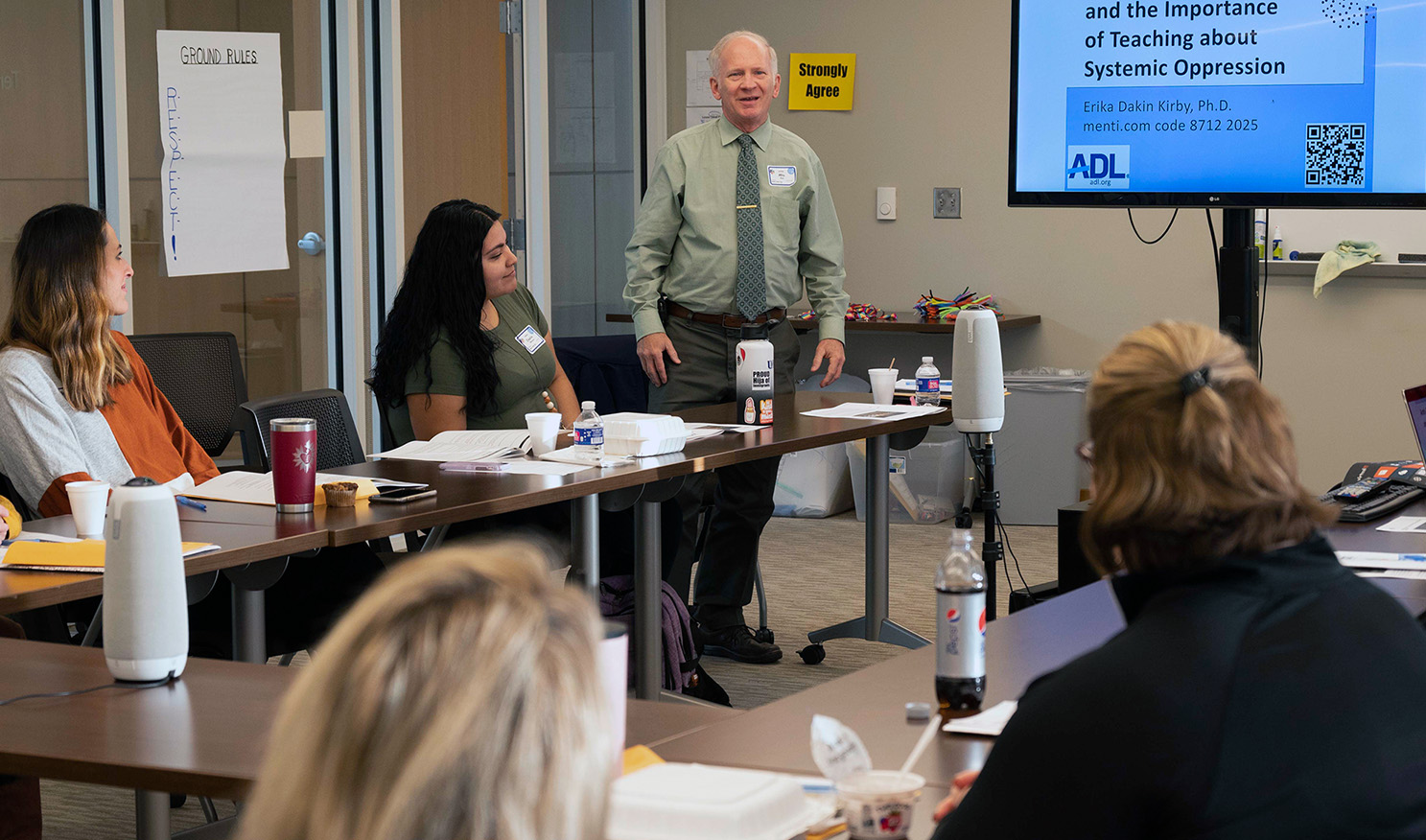
Guided by Jewish values, the nonpartisan Jewish Community Relations Council works in common cause with other religious, racial, ethnic, and civic groups to foster a just, democratic, and pluralistic society. The JCRC advocates, educates, collaborates, and mobilizes action on issues important to the Jewish Community and greater community to fight antisemitism and hate in all its forms and promote the security of Israel and Jews everywhere.
What is a JCRC? Subscribe to Our Newsletter“Anyone who can protest against the transgressions of one’s household and does not, is liable for the actions of the members of the household; anyone who can protest against the transgressions of one’s townspeople and does not, is liable for the transgressions of the townspeople; anyone who can protest against the transgressions of the entire world and does not is liable for the transgressions of the entire world.” (Talmud Bavli Shabbat 54b-55a
Support Our Work: Donate to JCRC OmahaThe Jewish Community Relations Council is dedicated to working in common cause to enhance cooperation with other religious, racial, ethnic, and civic groups to foster a just, democratic and pluralistic society as well as promote the security of Israel and Jews everywhere. Guided by Jewish values, the JCRC is a nonpartisan agency that advocates, educates, collaborates, and mobilizes action on issues important to the Jewish Community and the greater community. That work requires fostering and strengthening relationships across groups from different communities as well as our own, and often, communities with different beliefs, perspectives, and priorities.
The Omaha Jewish Community Relations Council’s public policy positions advance the ability of our organization to support our local, regional, and global Jewish community, with a special focus on upholding a healthy, safe, and caring community that is just, equitable, diverse, and inclusive; building bridges with other civic groups; and connecting with Israel and world Jewry. JCRC Omaha’s positions are derived from and aligned with the Jewish Federations of North America and the Conference of Presidents of Major Jewish American Organizations.
JCRC’s Public Policy and Civil Rights Committee advances public policy priority areas based on both the challenges that Jewish communal life faces and opportunities to further strengthen it. In supporting specific legislative and policy vehicles within each area below and in adding compelling legislative priorities, we prioritize issues with a nexus to the JCRC and community we represent, and we strive to be balanced and non-partisan. (These positions were approved by the JFO Board in August 2023)
Since 1856, Jews have lived, worked, and thrived in the State of Nebraska. However, our enduring presence does not guarantee our safety and security. We must be ever vigilant about the rise of antisemitism both in Nebraska and across the globe.
Jewish perspective:
Safety and Security: Jewish tradition teaches about the importance of protecting and cherishing every single life, for all life is holy. From the Mishnah we learn that “One who takes a life, it is as though they have destroyed the entire world. And one who saves a life, it is as if they have saved the entire world.” (Mishnah Sanhedrin 4:5). Each life is an entire world; we must work to safeguard every life using all tools at our disposal including accessing security enhancements for our communities and proactively engaging with our legislature to enact reasonable communal safety legislation.
Combating Anti-Semitism: Avot D’Rabbi Natan teaches: “Who is the strongest of all? One who overcomes his [her/their] inclinations…And some say one who can turn an enemy into a friend.” To combat antisemitism in all of its forms, we must work to build authentic relationships, taking these words to heart and finding common ground.
Support for Israel: The words of renowned poet Yehudah HaLevi remind us “My heart is in the East, and I am in the uttermost West.” Though we live here in Nebraska, for many, a piece of our heart resides in Israel. We look to the words of Israel’s national anthem, to guide us in HaTikvah, the hope, that we will find the ways to create a peaceful world where generations of Jews who come after us will call home. We may all answer the questions of whether Israel is a Jewish State or a State for Jewish People or a state that lives by Jewish values differently, and yet, we all sing the words of HaTikvah and pray for peaceful coexistence with our neighbors:
HaTikvah, by Naphtali Herz Imber: As long as the Jewish spirit is yearning deep in the heart, With eyes turned toward the East, looking toward Zion, Then our hope – the two-thousand-year-old hope – will not be lost: To be a free people in our land, The land of Zion and Jerusalem.
One of the greatest strengths of the Jewish community in Nebraska is its commitment to philanthropic giving to both Jewish and non-Jewish entities. We must continue to ensure that we serve as good stewards to our community and that we advocate to those in positions of power to ensure that public education, health care, and support for those in need are not diminished especially in times of such inequity.
Jewish perspective
Tikkun Olam, which translates to “repairing the world,” is a cornerstone of Jewish ethics and social responsibility. Tikkun Olam compels members of the community to actively participate in bettering the world and elevating the lives of others. And to repair the world, it is best to begin at our own doorstep–within our local community. Maintaining and improving the communal institutions that people rely upon are vital for the holistic betterment of society and thereby embodies the principles of Tikkun Olam.
Omaha is a vibrant, prosperous community but we know that not all residents have equal access to needed services to lead a thriving, healthy life.
Jewish perspective:
The notion that we all have a responsibility to care for the vulnerable among us (represented in our texts as “the poor, the orphan, the stranger, and the widow”) is a common thread woven throughout our sacred texts. Isaiah exhorts us: “Learn to do good. Devote yourselves to justice; Aid the wronged. Uphold the rights of the orphan; Defend the cause of the widow.” (Isaiah 1:17).
Reproductive Rights: Jewish law and thought do not hold a binary, black-and-white view of abortion. While our tradition affirms that a fetus must be respected and cared for as potential life, Jewish law also states that, because a fetus does not become a full “person” until birth, abortion is not only legitimate but required in instances where a pregnancy threatens the life of the mother (Mishnah Ohalot 7:6).
We must work to ensure that Omaha is a welcoming place for all. One way to ensure that is to make sure that we welcome the stranger with open arms. Another way is to always be thinking about our own biases and what we can do to mitigate them. Our community should be a place of inclusivity for all people.
Jewish perspective:
Genesis 1:27 teaches that God creates human beings b’tzelem Elohim, in God’s image, thereby imbuing each person with a touch of the Divine. Every person should be treated with the dignity and respect accorded to God’s creations. We have an obligation to create radically inclusive communities that create space for each person to be their authentic selves. As we advocate for inclusion and equity in our spaces, we remember that we are responsible for one another and that we are commanded to “love your neighbor as yourself” (Lev.19:18). As Rabbi Hillel taught in Pirkei Avot, “If I am not for myself, then who will be for me? If I am only for myself, then who am I? And if not now, when?” (Pirkei Avot 1:4).

Contact University of Nebraska chancellors and stand with Jewish students- make your voice heard!
See all the 2025 JCRC Priority Bills below and see a recap of the 109th session here: Legislative Session Recap 2025
Bills: Education, Antisemitism, Separation of Church and State
LB 538 (Hardin) Require school boards and postsecondary institutions to adopt policies against discrimination and antisemitism
LB 691 (Holdcroft) Require schools receiving state funds to display the Ten Commandments
LB 549 (Lippincott) Allow school boards to employ or accept a volunteer chaplain as a school counselor
LB 122 (Meyer) Require display of the national and state motto in schools (In God We Trust; Equality Before the Law)
LB 552 (Lippincott) Prohibit public secondary institutions from having a DEI office or requiring training or participation in DEI activities
Bills: Elections
LB 3 (Lippincott) Winner-Take-All
LR 24CA (Dorn) Winner-Take-All ballot initiative General File
LB 541 (Holdcroft) Eliminate online voter registration
LB 659 (Andersen) Voter machine auditing
LR 27CA (Hunt) Extend term limits for the legislature to 3 terms instead of 2
LB 218 (Fredrickson) Implement a voter registration process with state IDs and drivers licenses at the DMV Not prioritized.
LB 237 (M. Cavanaugh) Permit counties with populations greater than 10,000 residents to conduct vote by mail
Bills: Support for Families
LB 14 (Spivey) Hunger Free Schools
LB 505 (Prokop) Appropriate $20M over two years for food assistance nonprofits serving 10 counties or more
Family Medical Leave Act (Article summarizing Paid Sick Leave legislation)
LB95 (Fredrickson) Childcare employee subsidy pilot program
LB153 (Guereca) Extend postpartum coverage for moms and babies under the Children’s Health Insurance Program to six months
Bills: Immigration
LB181 (M.Cavanaugh) Extend Young Adult Bridge to Independence for young adults not lawfully present
LB 301 (Ibach) Allows eligible aliens to serve as law enforcement officials.
LB 299 (Ibach) Allows eligible aliens to access employment-related benefits such as retirement and unemployment benefits.
LB 532 (Kauth) E-verify for new hires, imposes penalties for hiring unauthorized aliens, auditing and reporting
Bills: Juvenile Justice
LB 556 (Riepe) Allows law enforcement to detain children at a younger age (from 13 to 11); lowers the age for charging minors with certain serious offenses from 14 to 12
LB407 (J. Cavanaugh) Juvenile court exclusive jurisdiction for minors aged 13-15)
LB584 (Spivey) Removes life in prison and other sentencing provisions for minors
LB700 (McKinney) Extends juvenile court jurisdiction to age 26, protections for minors during interrogation
Bills: Equal Rights
LB 223 (Guereca) Prohibit discrimination; lawful source of income
LB 89 ‘Stand with Women’ (Kauth)
Bills: Reproductive Rights
LB 273 (Hunt) Medical Power of Attorney
LB 655 (Murman) Medical conscience-based objections
LB 669 (Storer) Informed consent; pre-abortion counseling
LB 53 (M. Cavanaugh) Criminal and civil immunity for pregnancy outcomes
LB 512 (Holdcroft) Adopt the Chemical Abortion Safety Protocol Act
From Idea to Law – The Process Glossary (from information on nebraskaleigslature.gov)
Bill Referral refers to the process where the nine-member Reference Committee assigns bills to the appropriate standing committees for consideration. Once a bill is referred, the committee will hold a public hearing, and can then advance the bill, indefinitely postpone it (kill it), or hold it in committee.
Here’s a more detailed breakdown:
General File is the first time the full Legislature has the opportunity to debate and vote on bills. At this stage, senators consider amendments, which may be proposed by committees and by individual senators. Many people consider General File to be the most crucial stage of the legislative process because it is where most compromises are reached. Bills on General File may be amended, returned to committee, indefinitely postponed or advanced to Select File. A majority vote of the Legislature (25 votes) is required to adopt amendments or move a bill from General File to the next stage of consideration.
Select File is the second debating and voting stage. This step allows another opportunity for amendment, compromise and reflection. Bills on Select File may be indefinitely postponed or advanced to the next stage. After Select File, bills are sent to E & R again to be rechecked. Bills then are reprinted for Final Reading.
Final Reading
Before final passage, all bills are constitutionally required to be read aloud in their entirety by the Clerk of the Legislature, unless three-fifths (30 members) of the Legislature votes to waive the requirement. A bill may not be amended or debated on Final Reading, but may be returned to Select File for a specific amendment. Bills may not be voted on for final passage until at least five legislative days after the bill is introduced, and one legislative day after it is placed on Final Reading.
A proposed constitutional amendment requires a three-fifths vote of the elected members (30) to place it on the general election ballot and a four-fifths vote (40) to place it on a primary or special election ballot. All other bills without an emergency clause require a simple majority vote before going to the governor. A bill with an emergency clause requires a vote of two-thirds (33 members) of the Legislature.
Governor (Line-Item, Veto, Override, Signature)
After the Legislature passes a bill on Final Reading, it goes to the governor for consideration. The governor has five days, excluding Sundays, to decide what to do with a bill. If the governor signs a bill or declines to act on it, the bill becomes a state law. The governor may veto a bill, and he or she has the authority to strike specific budget appropriations (line-item veto). The Legislature may override any gubernatorial veto, although it takes a vote of 30 senators to do so.
View the most recent survey results of our Jewish communal priorities here.

View the 2022 survey results of our Jewish communal priorities here.
The JCRC welcomes the opportunity to speak to schools, businesses, faith-based institutions, service clubs, and other organizations.
Learn More